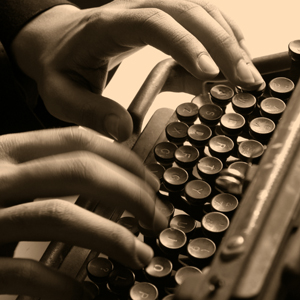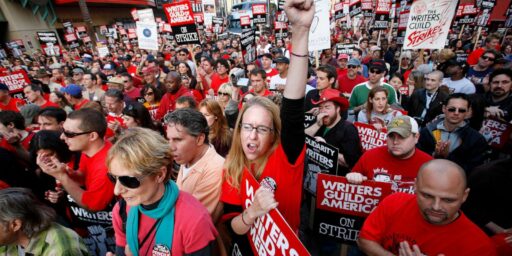Sad Truths About Book Publishing
 Joe Carter calls publishing a book “one of the most wonderfully disappointing experiences you’ll ever have.”
Joe Carter calls publishing a book “one of the most wonderfully disappointing experiences you’ll ever have.”
Don’t get me wrong, there are some genuine rewards to having a book published. You get to say that you’re an “author” rather than, say, a “blogger.” Also, you get the validation that at least one person (who gets paid to read for a living) thought that you wrote something that was worth reading and deserved a wider audience.
But if you decide you really want to write a book and are fortunate enough to find a publisher, there are some realities of book publishing about which you should be aware:
The post is worth reading in full but, basically, most books don’t sell, don’t wind up on the front table at Borders — or in a bookstore, period — and don’t make much, if any, money. The last is true even of many “bestsellers.” And you’ll spend a lot of time promoting the book.
There’s a lot of variation, depending on genre and publishing house. Some types of books sell much better than others and it doesn’t necessarily depend on quality. A political screed, especially one written by a celebrity, will outsell finely crafted political analysis. Well-established publishers are more likely to get your book picked up by the chains and reviewed in the right places.
And, of course, some authors make a very handsome living at their craft. Frequent OTB commenter Michael Reynolds, author of the Sideways Mencken blog and 150-odd teen lit books under various names, notably Michael Grant, is among them. He wrote this in the comments of a discussion on writing for money some months back:
When I talk to aspiring young writers I point at that it is either a hobby or a business. If it’s a business — if you intend to get paid — then you need to understand that part of it. People may or may not like the business aspect of it but if you want to get paid there’s not much point in railing against it. You don’t get paid for railing, you get paid for winning the game.
In many ways I’m no different than anyone else who produces a product for market.
[…]
I write online as a hobby. I blog or don’t as the mood strikes me.
Writing fiction however is my business so I treat it with a lot more seriousness. It has almost nothing to do with my mood. Moods are for hobbyists.
[…]
The problem with writing on-line is a lack of gatekeepers. You have, let’s say, a million people writing online. We as consumers skim around, looking here and there in a sort of chaotic way, to find what we like. 99% of blogs or online books are wastes of time, 1% are worth reading, but we don’t have a convenient guide to help us find the 1%.
A publisher is that guide. The fact that HarperCollins publishes me, immediately lifts me out of that vast field and makes me one of a 1000 rather than 1 of a million. Basically, it’s a lot easier for a reader to find me because I have the big red and blue HC logo stamped on my forehead. The reader can’t know whether I’m any good, but they can know that someone who should know (an editor) thinks I am.
[…]
I, on the other hand, had to succeed where tens of thousands of others had failed — in getting published and in getting Rupert Murdoch to write me a fat check. There are a lot more people in this country making a good living as doctors or lawyers than as fiction writers. Mine is a very competitive business. Everybody and his horse wants to do it.
To make a nice living in fiction you need talent, self-discipline, a capacity for work, a tolerance for risk, and a thick skin. It’s also nice if you have an instinct for the market and intellectual flexibility. How many on-line writers have all those things? Very few. If they did, let’s face it, they’d be published writers.
And, as Joe notes, even most of the people who make it past those not insignificant hurdles still don’t make a living at it.
What’s amazing to me is how large a percentage of books who make it through the above process are crap. Then again, I read mostly non-fiction and perhaps the barriers to entry there are simply lower. (Presumably, a novel or kids book should stand the test of time whereas most popular nonfiction books are quickly OBE.)






I am a library denizen, which might not be an author’s favorite creature. I do think I see pretty broad selection on the new-books shelves though. The new books show funny trends sometimes – a secondary amusement (all “bubbles” and “vampires”).
FWIW, I think Iain M. Banks “Transition” is weird and well-written. It’s certainly more well written than the average book with a parallel worlds “gag.”
I gather that “books read per year” is still falling, but couldn’t find a graphic.
I’ve read a lot of this from some of the lesser-known fantasy authors, who have that as an uphill battle in addition to all of the above. It’s just an endless battle to increase sales, and if you don’t make it, you just have to get a second job and the like.
Damn, that Michael Reynolds guy sounds like a genius . . .
The whole game is about to change in very interesting ways.
I’ve been hammering my friends at Harper kids books to realize that the end of publishing as we know it was nigh. I told them it was going to happen with shocking suddenness, and now it’s happening. With shocking suddenness.
I have to give a speech on the effects of technology on publishing so I’ve actually had to form semi-coherent thoughts on the matter. The market we have now goes like this: author to agent to publisher to printer to wholesaler to warehouse to retailer to consumer to ebay.
The new digital market will go through a phase where it will be author to agent to online retailer/marketer to reader. But I think that’s a transitional phase, too. The new model will be author to reader. A single step.
The dead tree publishers and bookstores are already under crushing price competition from Costco and Amazon. Amazon’s digital will push the price even lower and destroy the bricks and mortar stores and many of the publishers. But the ultimate price competition will come from the writers themselves creating direct author to reader markets.
I earn $1.80 off each hardcover. I can put the same book online for $4, spend a dollar on marketing and expenses and still almost double my take.
Better yet, I can break a 600 page manuscript into 6 monthly installments at $3 each, give up fifty cents per on PayPal processing, etc…, and still end up with $2.50 x 6. I’m no math whiz but I’m pretty sure $15.00 for a 600 page manuscript is better than $1.80. And the $3.00 price point lowers the bar significantly from an $18.00 hardcover. Lower price, more sales, higher percentage? If it works it’s utopia.
One other interesting point: the tick tock that gives a dead tree book maybe a month to make it in a bricks n’ mortar store does not exist online. An average Borders has maybe 10,000 title. The internet can store an infinite number of books.
John Personna:
Public libraries won’t last out the next decade.
Digital will drop book prices and drastically reduce the number of people willing to wait around to borrow an $18.00 or $25.00 hardcover.
At the same time the library’s research function is already obsolete.
The total number of constituents needing or supporting libraries will drop significantly and political (tax) support will collapse. School libraries will hang in there for a while, but the public library is dead man walking.
Seems to me Reynolds is spot on. Having a brand, or having a gatekeeper bless you can make or break. Of course, one presumes that attaining branded status, or getting that gatekeeper’s blessing is earned.
I also think an important point is the hobbyist vs pro comment. I have a friend who has attempted to break through in writing various pieces. Good stuff as best I can judge. But it has never really blossomed. She is a hobbyist. I am sure that making money at it requires “doing what it takes.” And that is a professional attitude, not a hobbyists.
It’s weird Michael. There seem to be new critics of libraries at the same time as record attendance. The people I meet seem to go one way or the other – users or disdainers. Attendance is discounted by critics as net-users but I don’t think that’s it. The ranks of reserved books at the front of the library are huge.
Certainly easy ebook borrowing would change the physical attendance picture … but a lot could depend on what constitutes a library’s ebook copy and what constitutes a “lend.”
Just a question about Ebooks or Ereaders or whatever they’re called: Is there some way of annotating the “book” in the margin (do they have margins?) so that I may write things like, “What a crock of shit! Does this idiot really believe this swill? Expect that we will??” or other pithy, withering observations as I do now in my “deadtree” (ugly word that) books? Can’t imagine reading a book and not being able to throw something at the author if the spirit moves.
I’ve been thinking about Michael’s 02:33 pm comment, and I don’t really like my 03:10 pm answer. I don’t know. It isn’t really clear to me who are the book buyers, who are the ebook buyers, and if the ebook buyers will “stick” past this Christmas trend/fad.
Sam:
Not yet they can’t, but don’t get hung up on Kindles. They’re transitional. Soon you’ll go directly to a page either owned or managed by the author, buy the book, and be able to offer direct feedback — much better than a note in the margin.
John:
The dead tree book is already under enormous price pressure from deep discounters and Amazon. The digital move will drive prices down even further. I’d guess the digital equivalent of a hardcover will be selling for 4-5 bucks pretty soon. That will destroy the traditional publishing market.
When books cost as little as a latte you won’t be borrowing them, you’ll be buying them. Or perhaps getting a sponsored version or ad-supported version for free. It will make no sense for tax-supported libraries to continue to exist — they’ll lose their middle class constituency.
Again, Reynolds seems to be right on top of it. My wife wants a (sp?) Kindle? A device to download books onto apple products.
Technology, baby.
I believe I have some books that sam used to own.
I like books, as to this strange new world that some of you will be embarking upon, I wish you the best.
michael, what happens to the lower class constituency when they need a $250 product to read Fahrenheit 451?
PD:
As mentioned above, the Kindle is transitional technology. This is all going to the web. So all you’ll need is a computer and a credit card.
Also we’re starting to look seriously at enhancing of digital books — adding text links to music, video, backstory, lesson plans, social networks, fan sites, art etc… In a desperate attempt to convince publishers they needed to look seriously at this my 12 year old built me a demo. http://getfre.com/ (Incidentally, you have to click on the blue hyperlinks — something that actually baffled some people in the publishing business.)
Bear in mind that’s just a brief demo using off-the-shelf stuff.
But we have nearly half of the households in this country without a computer and internet access. I mentioned a $250 device, merely because that would be cheaper than a computer. Probably a better topic for some other time.
Nice link to the book. The effect is something like Coupland’s Generation X, where supplemental images and information compliments the main story.
?
75% of Americans have Internet access.
Dave, I just did a quick google and scanned the results which were in the 51-60% range. Looking back at them, they are older then your Nielsen figures. A US census poll from 2007 puts home internet usage at 62%. LINK
You know, one of my responses to the library + internet was to divest myself of many books. It made no sense to leave something on the self when someone else could be reading it, and when I could find it again (or equivalent) at the library + internet.
I did buy about 5 nonfiction books last year, but read a few times that from the library. I used to buy paperback fiction, but when it got to $7 or $8 a copy it was a mental barrier.
Michael wrote “I’d guess the digital equivalent of a hardcover will be selling for 4-5 bucks pretty soon.”
Right, but ebooks represent a smaller available market even as they provide smaller distribution costs. Take book buyers, some smaller fraction of them become ebook buyers, …
It’s possible, but … a random book is now $16.47 hardback and $14.82 kindle …
Michael, this is absolutely brilliant. I mean, you’d have to be a genius to publish online, use photos, comments, and other digital media to tell a story rather than merely print. Brilliant, I says.
Brian:
And yet, despite your sarcasm, the concept has until very recently been too much for publishers to grasp. And the reaction from a lot of writers has been poisonous. One jackass is comparing the dead tree book to the Jews and the e-book to the Nazis. And this is a very established, well-respected author. A Jew himself, believe it or not.
You have to bear in mind that while we may think it’s 2009, it’s still the 19th century in the publishing world.
Two brief illustrative stories. In a meeting, discussing a web site for a book project, one of the pub’s tech experts wonders aloud whether we should have an arrow that says “click here” beside every hyperlink.
And TV ain’t much better. A Veep at a major network — a veep directly responsible for web content — says “I don’t really think the internet is very useful.” This happened six months ago, not a decade ago.
When I first started talking about this model — particularly including advertising links — you’d have thought I was proposing unprotected sex in church. We created the frebook demo because if you say, “Kinda like Wikipedia only you don’t have to navigate away from the page,” you get blank stares.
On the plus side some publishers have now discovered what a “web site” is.
Brian:
One more brief example. You know how publishers get data on their readers? The answer is: they don’t. They have literally no capacity to identify their demographic. It’s all by feel. A billion dollar business and they have not so much as a scrap of reliable data on their consumers.
I’m not much of a book reader but I can tell you that for me, books won’t go away until they make a Kindel type device that you can drape over your face at the beach, is sand and water resistant, and no one would care to steal if they saw it laying on your chase lounger.
It’s funny you bring this up, because, whenever I pick up a book, I always think to myself,”that font looks so old; i wonder if it has ever changed.”
I used to think that maybe this was an imagined observation, like I saw an reprint of classic literature and took that to mean that’s what “antiquated” font looks like. It seems that may be evidence to what you say after all!
Anyway, I think that you are absolutely right. Take the ad links idea for instance. Ten years ago, many marketing experts laughed aloud about the viability of web advertising. Turns out, for the last few years, web advertising has well taken over print advertising and the margin is growing.
The point is, books are just a medium for story. The important thing (to people, not necessarily businesses) is the story itself. If there is a more efficient way of getting story to people, it will eventually win out.